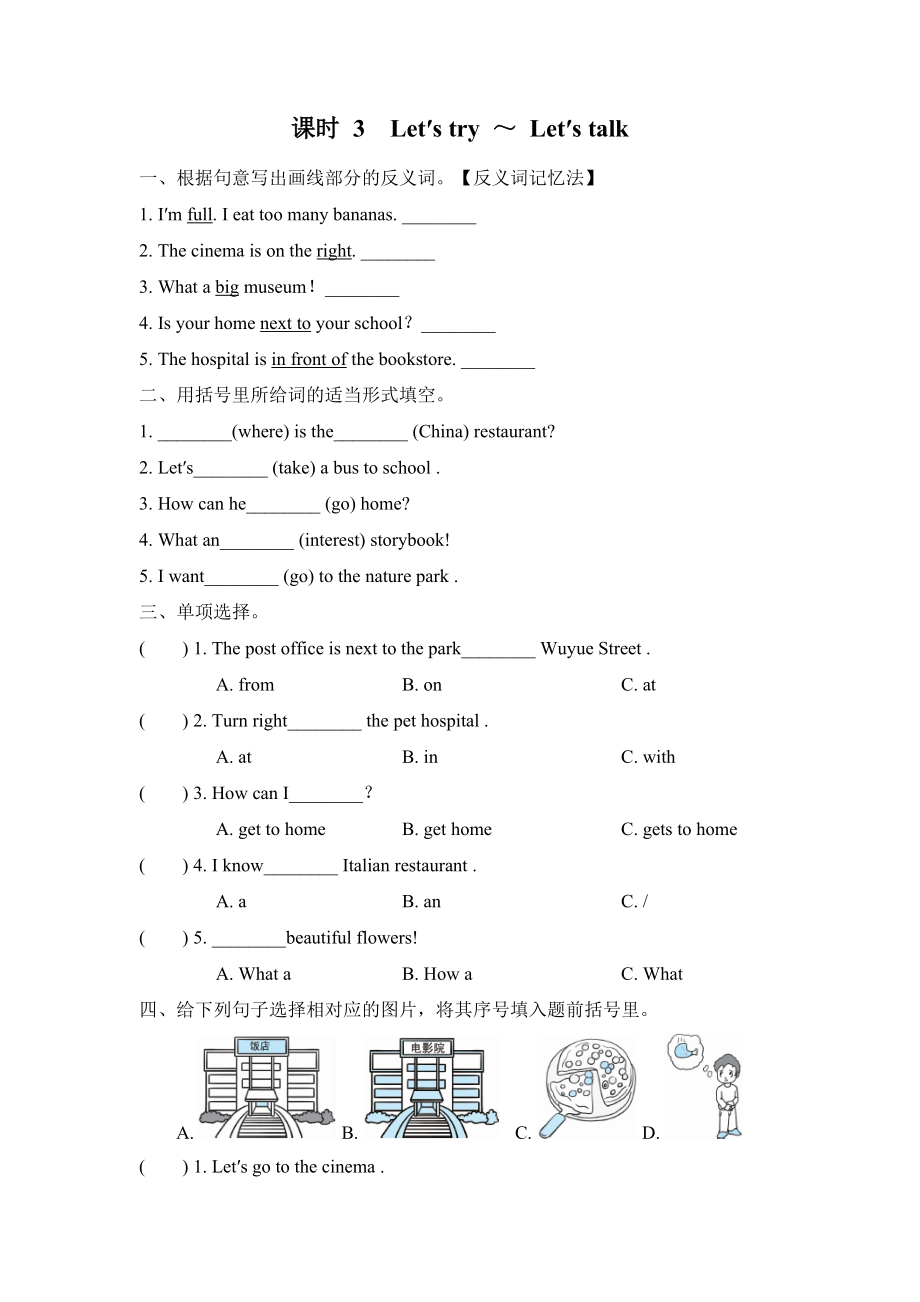《【優(yōu)選】六年級(jí)上冊(cè)英語(yǔ)一課一練Unit 1課時(shí)3:Let39;s try》由會(huì)員分享���,可在線(xiàn)閱讀����,更多相關(guān)《【優(yōu)選】六年級(jí)上冊(cè)英語(yǔ)一課一練Unit 1課時(shí)3:Let39;s try(3頁(yè)珍藏版)》請(qǐng)?jiān)谘b配圖網(wǎng)上搜索�����。
1���、課時(shí) 3 Let′s try ~ Let′s talk
一����、根據(jù)句意寫(xiě)出畫(huà)線(xiàn)部分的反義詞����?����!痉戳x詞記憶法】
1. I′m full. I eat too many bananas. ________
2. The cinema is on the right. ________
3. What a big museum����!________
4. Is your home next to your school�����?________
5. The hospital is in front of the bookstore. ________
二�����、用括號(hào)里所給詞的適當(dāng)形式填空���。
1. _
2、_______(where) is the________ (China) restaurant?
2. Let′s________ (take) a bus to school .
3. How can he________ (go) home?
4. What an________ (interest) storybook!
5. I want________ (go) to the nature park .
三�、單項(xiàng)選擇。
( ) 1. The post office is next to the park________ Wuyue Street .
A. fr
3���、om B. on C. at
( ) 2. Turn right________ the pet hospital .
A. at B. in C. with
( ) 3. How can I________����?
A. get to home B. get home C. gets to home
( ) 4. I know________ Italian restaurant .
A. a B. an C. /
( ) 5. ________beautiful flowers!
A. What a B. How
4、a C. What
四���、給下列句子選擇相對(duì)應(yīng)的圖片���,將其序號(hào)填入題前括號(hào)里。
A. B. C. D.
( ) 1. Let′s go to the cinema .
( ) 2. I like pizza very much .
( ) 3. My parents have lunch in the restaurant .
( ) 4. John is very hungry .
五���、看圖�,將下列句子補(bǔ)充完整�����。
1. How can I________ ________ ________ ________�����?
2. I′m hungry . Le
5����、t′s go to________ ________ ________.
3. ________ ________at the post office .
4. The school is________ ________ the________.
�答案:
一、1. hungry 2. left 3. small 4. far from 5. behind
方法點(diǎn)撥:此題型用反義詞記憶法解答����。
二����、1. Where; Chinese
2. take 點(diǎn)撥:Let's+動(dòng)詞原形�。
3. go 點(diǎn)撥:can情態(tài)動(dòng)詞后跟動(dòng)詞原形。
4. interesting
6���、點(diǎn)撥:本題修飾故事書(shū)�����,用形容詞interesting�����。
5. to go
三���、1. B 2. A
教師范讀的是閱讀教學(xué)中不可缺少的部分����,我常采用范讀,讓幼兒學(xué)習(xí)�、模仿。如領(lǐng)讀�,我讀一句�����,讓幼兒讀一句���,邊讀邊記;第二通讀���,我大聲讀�,我大聲讀���,幼兒小聲讀�����,邊學(xué)邊仿����;第三賞讀�����,我借用錄好配朗讀磁帶���,一邊放錄音���,一邊幼兒反復(fù)傾聽(tīng)�,在反復(fù)傾聽(tīng)中體驗(yàn)����、品味。3. B 點(diǎn)撥:get to+名詞�,home是副詞,故為get home���。
教師范讀的是閱讀教學(xué)中不可缺少的部分���,我常采用范讀,讓幼兒學(xué)習(xí)���、模仿�。如領(lǐng)讀���,我讀一句,讓幼兒讀一句���,邊讀邊記���;第二通讀�����,我大聲讀����,我大聲讀����,幼兒小聲讀,邊學(xué)邊仿����;第三賞讀,我借用錄好配朗讀磁帶�,一邊放錄音,一邊幼兒反復(fù)傾聽(tīng)�,在反復(fù)傾聽(tīng)中體驗(yàn)、品味�。4. B
5. C 點(diǎn)撥:感嘆句結(jié)構(gòu)為:“What+形容詞+可數(shù)名詞復(fù)數(shù)!”。
四���、1. B 2. C 3. A 4. D
五�、1. get to the bookstore 2. an Italian restaurant
3. Turn right 4. next to; museum
 【優(yōu)選】六年級(jí)上冊(cè)英語(yǔ)一課一練Unit 1課時(shí)3:Let39;s try
【優(yōu)選】六年級(jí)上冊(cè)英語(yǔ)一課一練Unit 1課時(shí)3:Let39;s try

